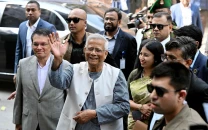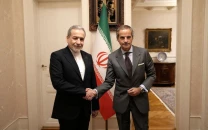Iran pushes for peace talks in Syria conference
Pakistan seeks a non-violent solution for the Syrian crisis.

Iranian Foreign Minister Ali Akbar Salehi told reporters after the meeting that "a major part of the opposition has announced that it is ready to negotiate with the Syrian government in Tehran without any preconditions."
But there was no confirmation from the Syrian opposition, which, like Syria's government, did not attend the Tehran conference.
Salehi offered few other details about the initiative, other than that Iran would coordinate soon with Syria's government on how to move forward.
Thursday's four-hour meeting gathered several countries, notably Russia, China, Cuba, Iraq and Venezuela, that are friendly to Iran. Others included Afghanistan, Algeria, India, Indonesia, Pakistan and Zimbabwe.
Most of the nations that took part were represented by ambassadors residing in Tehran, not foreign ministers.
Countries that Iran has accused of arming the Syrian opposition -- the United States and its European allies, Turkey, Saudi Arabia and Qatar -- were excluded.
The participants expressed "serious concern over the continuation of clashes and violation of human rights in Syria" and rejected any foreign intervention, Salehi said.
He added that the discussions focused on a ceasefire for Syria, humanitarian aid, and preparing the ground for national dialogue.
The meeting agreed to establish a contact group on Syria that would hold another meeting at a time and place to be notified, he said.
Iran offered no change in its stalwart support for the regime of Syrian President Bashar al-Assad.
Instead Salehi indicated that Tehran intended any Syrian national dialogue to focus on furthering political reforms Assad had promised, but which the opposition seeking his ouster has dismissed as insincere and meaningless.
"We want them (the opposition) to sit down with the Syrian government and cooperate so that the implementation of the reforms can be hastened and help the violence stop," Salehi said.
He also warned that Western nations backing Syria's rebels risked stoking "extremism" and repeating "the same error" as in Afghanistan, where US and NATO troops have struggled against a tenacious Taliban enemy.
"It is an error to think that by keeping up pressure that the Syrian regime will change," he said.
Salehi said Tehran had been in contact with some Syrian opposition factions over the past year but he did not say which one was ready to negotiate with the Syrian government.
On Tuesday, a top aide to Iran's supreme leader Ayatollah Ali Khamenei flew to Damascus to assure Assad that Tehran would not let their anti-Israel alliance collapse.
"Iran will never allow the resistance axis -- of which Syria is an essential pillar -- to break," said the envoy, Saeed Jalili.
The US ambassador to the United Nations, Susan Rice, in an NBC television interview on Thursday accused Iran of playing a "nefarious" role in the Syria conflict and said its "axis of resistance" was "bad for the region."
She also said the "momentum is shifting clearly in favour of the opposition."
The United States and Russia, in particular, differ on how to tackle the Syrian conflict, stalling any UN action. Moscow and Beijing have vetoed three attempts within the Council to sanction Assad's regime, earning US opprobrium.


















COMMENTS
Comments are moderated and generally will be posted if they are on-topic and not abusive.
For more information, please see our Comments FAQ